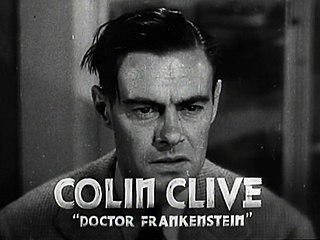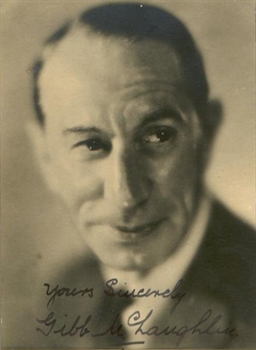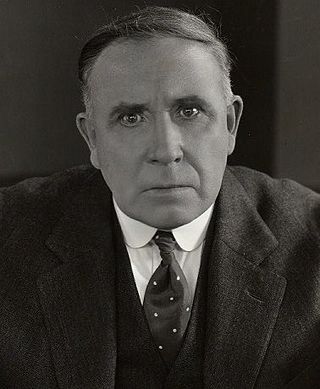Related Research Articles

Lady Constance Malleson was a British writer and actress. The daughter of Hugh Annesley, 5th Earl Annesley, Malleson studied at the Royal Academy of Drama Art and was a popular theater performer.

Colin Glenn Clive was a British stage and screen actor. His most memorable role was Henry Frankenstein, the creator of the monster, in the 1931 film Frankenstein and its 1935 sequel, Bride of Frankenstein.

Rolfe Sedan was an American character actor, best known for appearing in bit parts, often uncredited, usually portraying clerks, train conductors, postmen, cooks, waiters, etc.

Hardie Hunter Albright was an American actor.

Leo Sheffield, born Arthur Leo Wilson, was an English singer and actor best known for his performances in baritone roles of the Savoy Operas with the D'Oyly Carte Opera Company.

Carl Stockdale also known as Carlton Stockdale was one of the longest-working Hollywood veteran actors, with a career dating from the early 1910s. He also made the difficult transition from silent films to talkies.

Richard Tucker was an American actor. Tucker was born in Brooklyn, New York. Appearing in more than 260 films between 1911 and 1940, he was the first official member of the Screen Actors Guild (SAG) and a founding member of SAG's Board of Directors. Tucker died in Woodland Hills, Los Angeles from a heart attack. He is interred at Forest Lawn Memorial Park, in an unmarked niche in Great Mausoleum, Columbarium of Faith.

George McLoughlin, known professionally as Gibb McLaughlin, was an English film and stage actor.

DeWitt Clarke Jennings was an American film and stage actor. He appeared in 17 Broadway plays between 1906 and 1920, and in more than 150 films between 1915 and 1937.

George Henry Irving was an American film actor and director.

David Torrence was a Scottish film actor. He appeared in more than 100 films between 1913 and 1939. He has a star on the Hollywood Walk of Fame. He was the brother of actor Ernest Torrence. He was born in Edinburgh, Scotland and died in Los Angeles, California.

Robert Frazer was an American actor who appeared in some 224 shorts and films from the 1910s until his death. He began in films with the Eclair company which released through Universal Pictures.
André van Gyseghem was an English actor and theatre director who also appeared in many British television programmes.
A. R. Whatmore was a British actor, playwright and producer of plays.

Viola Lyel was an English actress. In a long stage career she appeared in the West End and on Broadway, for leading directors of the day, including Sir Barry Jackson, and Nigel Playfair. Her roles ranged from Shakespeare and Restoration comedy to melodrama and drawing room comedies.

In 1898 William Morton's Theatre Royal showed a 'Veriscope' film, probably the first time any film was shown in a Hull theatre. The Prince's Hall was the first purpose-built cinema in Kingston upon Hull, and was opened in George Street by Morton in 1910. As Hull embraced the new age of public entertainment, attendances at traditional theatre declined. Luxurious cinemas, taking their inspiration from theatres and music halls, were built to accommodate audiences in almost every neighbourhood in the city. By 1914, there were 29 cinemas, theatres and halls showing films in the city. The London and Provincial Cinema Company owned the Hippodrome; the National Electric Picture Theatres owned the Theatre de Luxe, but Morton's was the largest and most influential cinema chain in Hull.
Woolf & Freedman Film Service was a UK film distributor which was founded by film producer C. M. Woolf, and which operated from 1919 to 1934. The company distributed more than 140 films over a 15-year period. In 1935, Woolf formed a new company, General Film Distributors.

William Morton was an amusement caterer, a theatre and cinema manager in England for 70 years.
Frederick Ward was an English-born actor and theatre manager in Australia. He founded Sydney's first repertory theatre.
References
- 1 2 ‘Hull Repertory Theatre’, Hull Daily Mail, 7 February 1934 p. 10
- ↑ "Hull New Theatre history". Hull City Council. Retrieved 1 January 2010.
- ↑ ‘”Repertory” for Hull’, Hull Daily Mail, 12 August 1924 p. 6
- 1 2 3 "Social institutions | British History Online". www.british-history.ac.uk. Retrieved 12 August 2016.
- ↑ 'Negotiations for Purchase', Hull Daily Mail, 22 March 1928 p. 10
- ↑ 'Ready by September?', Hull Daily Mail,17 January 1929 p. 6
- ↑ ’Future Plans’, Hull Daily Mail, 21 January 1930 p. 6
- ↑ "The Dramatic List Who's Who In Theatre, A Biographical Record Of The Contemporary Stage, Tenth Edition". archive.org. Retrieved 12 August 2016.
- ↑ ‘Hull Repertory Theatre’, Hull Daily Mail, 16 June 1930, p. 5
- ↑ ‘Hull Little Theatre’s New Manager’, Hull Daily Mail, 4 August 1933 p. 10
- ↑ ‘Hull Little Theatre, Another Slump’, Hull Daily Mail, 10 August 1934 p. 10
- ↑ ‘Repertory Season’, Hull Daily Mail, 18 September 1933 p. 8
- ↑ "Who's Who in Theatre, passim" . Retrieved 1 January 2010.
- 1 2 Rowell, George; Jackson, Tony (1984). The repertory movement: a history of regional theatre in Britain. Cambridge University Press. ISBN 978-0-521-31919-5.
- ↑ "Maurice Denham". filmreference.com. Retrieved 1 January 2010.
- Gardiner, Bennitt (1976) "Colette O'Niel: a Season in Repertory", Russell: the Journal of Bertrand Russell Studies: Vol. 96: Iss. 2, Article 5. An account of the season spent by Lady Constance Malleson (Colette O'Niel) with Hull Little Theatre Company in 1925